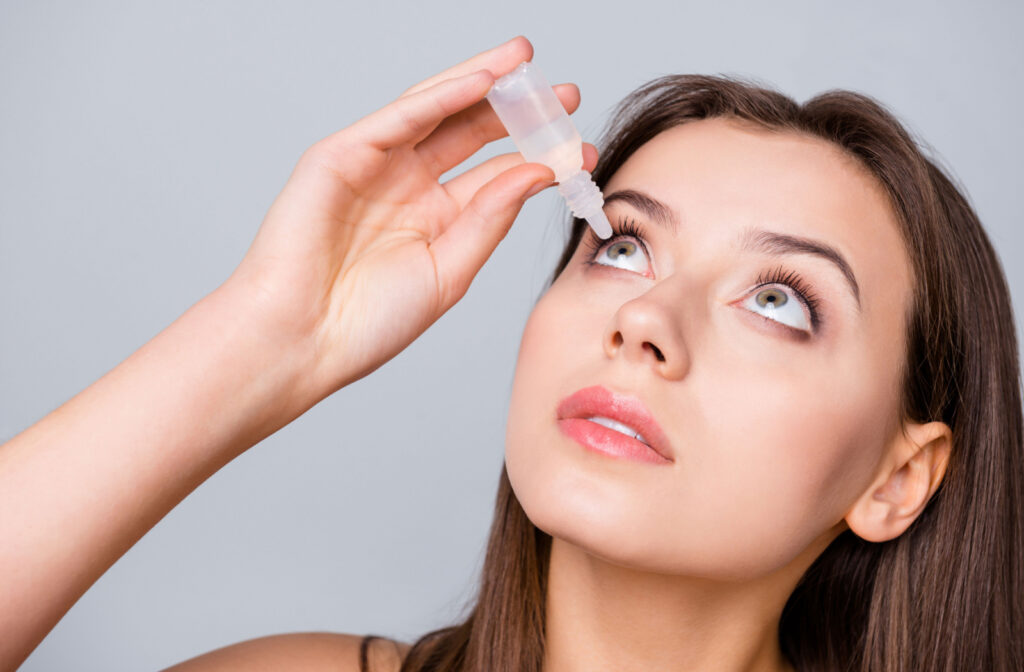Taking care of your eyes is crucial, and for many, eye drops are essential for eye health. Whether you’re dealing with dry eyes or allergies, eye drops can provide relief and improve your quality of life in the short term.
However, like any other medication, it’s important to understand the shelf life of your eye drops.
You should only use eye drops up to the expiration date set by the manufacturer or more than 3 months after opening, depending on the type of eye drops.
If you want to try eye drops to help relieve uncomfortable symptoms, visit your optometrist for recommendations to suit your eye care needs.
How Long Do Eye Drops Last?
The Type of Eye Drops Matter
The shelf life of your eye drops depends on the type of medication you’re using. For instance, preservative-free eye drops tend to have a shorter shelf life than those with preservatives.
Over-the-counter (OTC) preservative-free eye drops come in single-use vials and must be used within 24 hours after opening. However, eye drops with preservatives can typically last up to 3 months after opening.
Prescription eye drops can contain medicines such as antihistamines, decongestants, antibiotics, or steroids to address severe allergies, treat infections, or fight inflammation. These ingredients can degrade at a different rate than OTC drops, so following your optometrist’s instructions is crucial.
If you have an unopened bottle of eye drops in your medicine cabinet, refer to the manufacturer’s expiration date. Always check the label of your eye drops to see how long they’re supposed to last, and follow the usage instructions carefully.
Storage is Key
Storage is a crucial factor in the shelf life of your eye drops. Generally, eye drops should always be kept in a cool, dry, and dark place. Avoid exposing your eye drops to direct sunlight or high temperatures. Store them in a cabinet or drawer where they cannot get knocked over or damaged. When it comes to carrying your eye drops with you, always use a well-sealed container to avoid air from entering and reducing their shelf life.
If you struggle to put eye drops in, ask your optometrist or pharmacist if you can refrigerate them. For many patients, it’s easier to feel cold drops, making it easier to tell if the drop landed in the eyes.
What Happens If You Use Expired Eye Drops?
Before the expiration date, the product is still stable and at its standard potency, but the manufacturer can’t guarantee the same quality beyond the expiration date. If you accidentally use older eye drops that should’ve been disposed of, visit your optometrist for an eye exam.
Decreased Effectiveness
Over time, the active ingredients in eye drops, including glycerin for lubrication, can break down, making them less effective and safe in treating specific eye conditions.
Once eye drops are exposed to oxygen after opening, the medicinal chemicals degrade, and the solution weakens. Using expired eye drops may not reduce the symptoms you’re trying to treat, and it may irritate your eyes instead.
Risk of Eye Infections
The preservatives in eye drops help keep the mixture sterile throughout its lifespan. However, as the expiration date passes and the preservatives weaken, bacteria can contaminate the solution. When you use expired eye drops, the germs growing in the bottle can enter your eye, causing eye infections.
You should seek care from your optometrist if you notice any signs or symptoms such as:
- Redness
- Swelling
- Irritation
- Watery eyes
- Discharge
- Blurry vision
- Light sensitivity
Increased Risk of Allergies
Prolonged use of expired eye drops can irritate the eye surface, making them more vulnerable to allergies, and worsen the symptoms you’re trying to treat. As the medicine breaks down, the chemicals become irritants, inducing allergic reactions that range from mild irritation to severe eye reactions.
How to Keep Track of Your Eye Drops’ Expiration Date
You can’t remember everything, and your eye drops bottle is the last thing on your mind when you’re living a busy life. There are methods to track your expiration dates to make life simpler.
Label Your Bottles
Just like you label food in your freezer, make it a habit to write the date you opened a bottle of eye drops directly on the label using a permanent marker. This way, you can easily track how long it’s been since you opened the bottle and when it will expire. Also, label the bottle with the name of the eye drops and any dosage instructions for reference.
Keep a Medication Log
If you have multiple eye drops or other medications you take regularly, consider keeping a log that includes the name of the medication, the date you opened it, and the expiration date. You can also track any dosage changes or side effects. This log can be helpful for you to manage your medication use, as well as for your optometrist to review during your visits.
Set Reminders
Your digital devices can keep track of everything, so use your phone or a calendar app to set reminders for when your eye drops will expire. This can be particularly helpful if you have multiple bottles with different expiration dates. Set reminders for when you need to refill your prescription to have fresh eye drops on hand.
Book an Eye Exam for Preventative Eye Care
Eye drops are a helpful tool to help provide quick relief when you need it. But if you need to use them multiple times a day to feel comfortable, visit Bluebird Vision + Wellness for an eye exam.
We can assess your eyes for ocular conditions and help find a treatment option that provides long-term relief.




